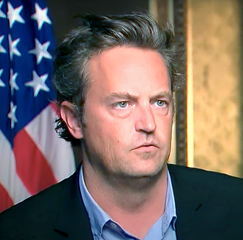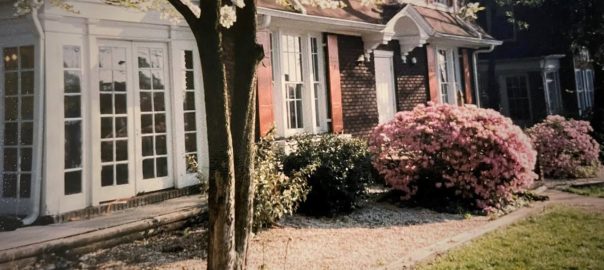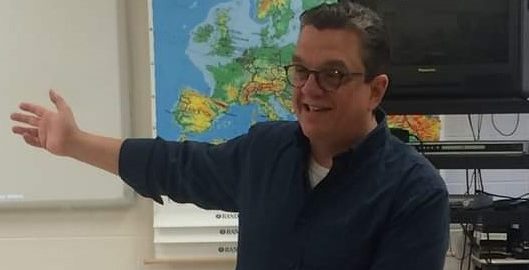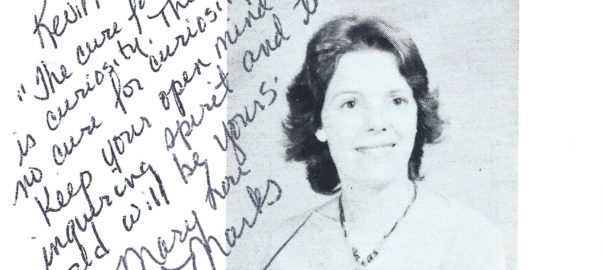Last night, Leslie and I sat in our living room chatting with my cousin Steve, who was visiting from Florida. Somehow, the conversation turned to Friends star Matthew Perry. As Leslie can attest, I have been talking a lot about Perry in recent weeks. In September, I decided to move well outside my area of interest and my literary comfort zone to read his 2022 memoir, Friends, Lovers, and the Big Terrible Thing. I tried to describe to Steve the degree of Perry’s self-confessed addictions and the physical, mental, and emotional damage they have visited upon him. We talked of his 55 Vicodin per day habit, the corrupt people who helped him feed it, and how the opiates caused his colon to “explode,” nearly killing him and leaving him with a temporary colostomy bag. As to whether he was still using, I said that Perry wrote in the book’s closing chapter that he has stopped. I concluded on a pessimistic note, though. I didn’t see how anyone so severely addicted and with all that money could ever quit.
About 15 minutes later, our youngest child Quinn, who is a college student living on campus, sent Leslie a text message that read, “MATTHEW PERRY DEAD!”
I will state up front that I am not holding myself out as an authority on the life and career of Matthew Perry. With the exception of a handful of favorite actors and musicians, my opinions on celebrities and their usually self-imposed torments range from indifference to contempt. Until I picked up his book, my knowledge of Perry’s life and his struggles would have fit in one modest paragraph. To my surprise, I wasn’t twenty pages into this thing before I was thinking to myself, “I must write something about this book. My friends are going to be so surprised when I do.” I finished the memoir about five days ago; its author is now dead, and here I am writing something far different than what I had planned.
Like many people my age and younger, I watched Friends off and on during its original run and have occasionally watched since, though I was never a dedicated fan. I did think the writing was clever and funny and that the principal stars were immensely talented. It was light. It was breezy. The characters were lovable and quirky, and if you watched it just to laugh and relax, you would; I did, anyway. I remember the first time I saw the show. Leslie always watched it. She and I were engaged, and I happened to be at her house when it came on. It was season 2, episode five (yes, I had to look that up): “The One with Five Steaks and an Eggplant,” in which Ross, Monica, and Chandler, all relatively successful in professional careers, are not sensitive to the financial problems of Phoebe, Joey, and Rachel, who are struggling in dead-end jobs. This puts a strain on their friendships: a problem that seems relatable enough.
It is fashionable, today, for people to burnish their images by denouncing Friends: It was trivial. It was a series of one-liners. It was unrealistic. It belabored story arcs. It wasn’t diverse. It was insensitive. None of these is universally true of the show, but each has some validity. It is easy to forget, though, that Friends, like every other entertainment offering, was simply a reflection of its time. The show was nothing less than an entertainment phenomenon during its run, and it did feature, for those who chose to see them, themes that mattered: the angst of modern twenty-somethings trying to find their way in a complex and changing urban landscape; the search for love and acceptance; the post-modern phenomenon, often noted by sociologists, of young adults in the developed world moving beyond their birth families, not to marry and establish their own, but to cling to a new kind of “family” made up of peers: “Friends.” I can attest that Friends is not a generational relic, either. I teach in a high school. Just days ago, I saw a student wearing a T-shirt with the Friends logo, and a student-made poster hanging in the hall features “Central High” in a style obviously meant to mimic the logo of Central Perk, the coffee shop that serves as a gathering place on the show. Nearly twenty years after its final episode, Friends is hip again.
I estimate that I have seen maybe a fourth of the 236 Friends episodes. That’s just a guess. Leslie and I have divergent TV tastes, so now, in the age of streaming, we try to have something serious and something light to enjoy together. A few weeks ago, we decided, for our light fare, to begin streaming Friends. As I watched the smiling, handsome, and seemingly healthy “Chandler” who splashed in a fountain in the opening credits degenerate into the drawn, 130 pound ghost of late season 2, I decided to read Perry’s book.
I was utterly shocked by much of what I read even early in Perry’s story. His parents were numbered among the “beautiful people.” They met when his father, a musician, was performing at a beauty pageant in which his mother, the previous year’s winner, was to crown the new queen. His parents’ marriage ended early on, and little Matthew grew insecure and troubled. His mother became Canadian prime minister Pierre Trudeau’s press secretary, while his father went to California to pursue his dream of acting, which resulted in his becoming the “Old Spice Man” of advertising fame. Who knew?
Perry was drinking by 14, was in California pursuing his own acting career by about 16, and had some success. Eventually, he was drinking entire bottles of vodka (“the kind with the handle”) in one night and became so hopelessly addicted to opiates that he required more than 50 per day just to function. Along the way, he used his incredible sense of comedic timing, his unique speech cadences, and his undeniable charm to win one of the most coveted acting roles in Hollywood: “Chandler Bing,” in what was then called Friends Like Us.”
In his memoir, Perry outlines how the main cast members were all warned that their lives were about to change forever and how they all became unbelievably rich. His love for his fellow members of the Friends sextet was unconditional to the end. He reveals his unrequited longing for Jennifer Aniston; how Courteney Cox demanded equal billing for all six actors, when she, with her previous sitcom success, might have demanded more than the others; and how David Schwimmer, already well-known in some circles, matched Cox’s selflessness when he insisted that all six actors negotiate for salary as a unit, rather than separately. Schwimmer, Perry asserts, made them all multi-millionaires. Matt LeBlanc, says Perry, was the cast member who had the least to lose and who grew the most on the show. Lisa Kudrow was the funniest person he ever knew.
As I read Big Terrible Thing, I grew more fond of the show and reflected more about the cult of celebrity and what it must have been like for these six young, beautiful, talented, and mostly unknown people to suddenly be caught up in this whirlwind. Perry, and probably all the rest of them, had prayed for fame and fortune, but that could not have prepared them for the magnitude of what came. I found it endearing that they clung to, and fought for, and defended each other. Never was this more the case than when the others had to close ranks to help their friend Matthew Perry, who descended into his personal hell despite (as he regularly points out) the money and the fame he had so craved.
Big Terrible Thing is not a happy book. It is the story of a talented, successful, and very rich young man who, as he implies, would have traded it all to be normal and to be able to live his life without poisoning himself. It has moments that remind the reader how different our ordinary lives are from those of the rich and famous. In one account, Perry is in a wildly expensive drug and alcohol rehabilitation center (one of many in his lifetime) in Switzerland, on the shores of Lake Geneva. The center discharged him with, he thought, an agreement that a California physician with whom they consulted would place him on a maintenance regimen of his favorite opioids. He arrived home to find that the California doctor refused to do so, saying he only had to “consult” with the doctors in Switzerland but did not have to follow their instructions. Perry made a call, put down $170,000 to charter a private jet, and flew back to Switzerland for his drugs that very night.
Not surprisingly, a man living such a life has many opportunities for reflection and to develop bitter hatreds. Perry hated people who said addicts should just “quit.” He hated the “industry” of high-end drug and alcohol rehabilitation facilities that cater to celebrities and the wealthy, considering them opportunistic scams set up to part desperate people from their money. He hated (in no uncertain terms) the manufacturers of colostomy bags because of the poor quality and humiliating failures of their products. Indeed one of the things that finally did induce him to stay clean toward the end was the fear, instilled in him by a brutally honest doctor, that if he required another colostomy it would likely be permanent.
Perry’s years of suffering also left him with sincere loves. He loved his mother and father, despite his rocky relationships with them and the undeniable truth that they often failed him when he was a child. He loved Julia Roberts, one of the most famous and beautiful women in the world, who pursued him when he was only just becoming known and became his girlfriend. He amazed her by breaking it off with her, not because he didn’t want her, but because he was terrified she would desert him. He loved Alcoholics Anonymous because it doesn’t give up on people no matter how many times they fail and because, when he was able, it allowed him to help other addicts. He loved everyone directly connected to Friends. Indeed, there were times when his love for the show and his unwillingness to let down the cast and ruin their lives was the only thing keeping him alive. He loved life. This last seems unlikely, but he said so over and over. He was, at heart, a happy person who lived to make people laugh, something he had been doing almost since he could walk.
At the end of his memoir, Matthew Perry, whom, he had written earlier, you the reader may know by “another name,” professed that he was clean and sober but physically destroyed; covered in scars, both physical and emotional; and quite alone when he might be sitting with any one of a dozen beautiful women watching his children play. Over and over, he said or implied two things: through it all he wanted to live, and money and fame don’t fix you if you’re broken, no matter how ridiculous those without money and fame might find such an assertion.
Matthew Perry, “Chandler Bing,” died last night. He embraced his own troubled life, and he dreaded death, a bigger and even more terrible thing. He drowned in a hot tub at his home. Early reports indicate there were no drugs present. A month ago, I barely would have noticed; now I find myself quite saddened by it all and wishing he could have lived to win back some of what he lost and to help more people. I guess that’s the power of the written word.



